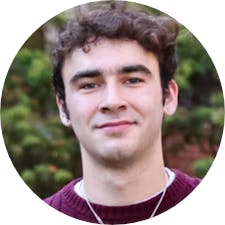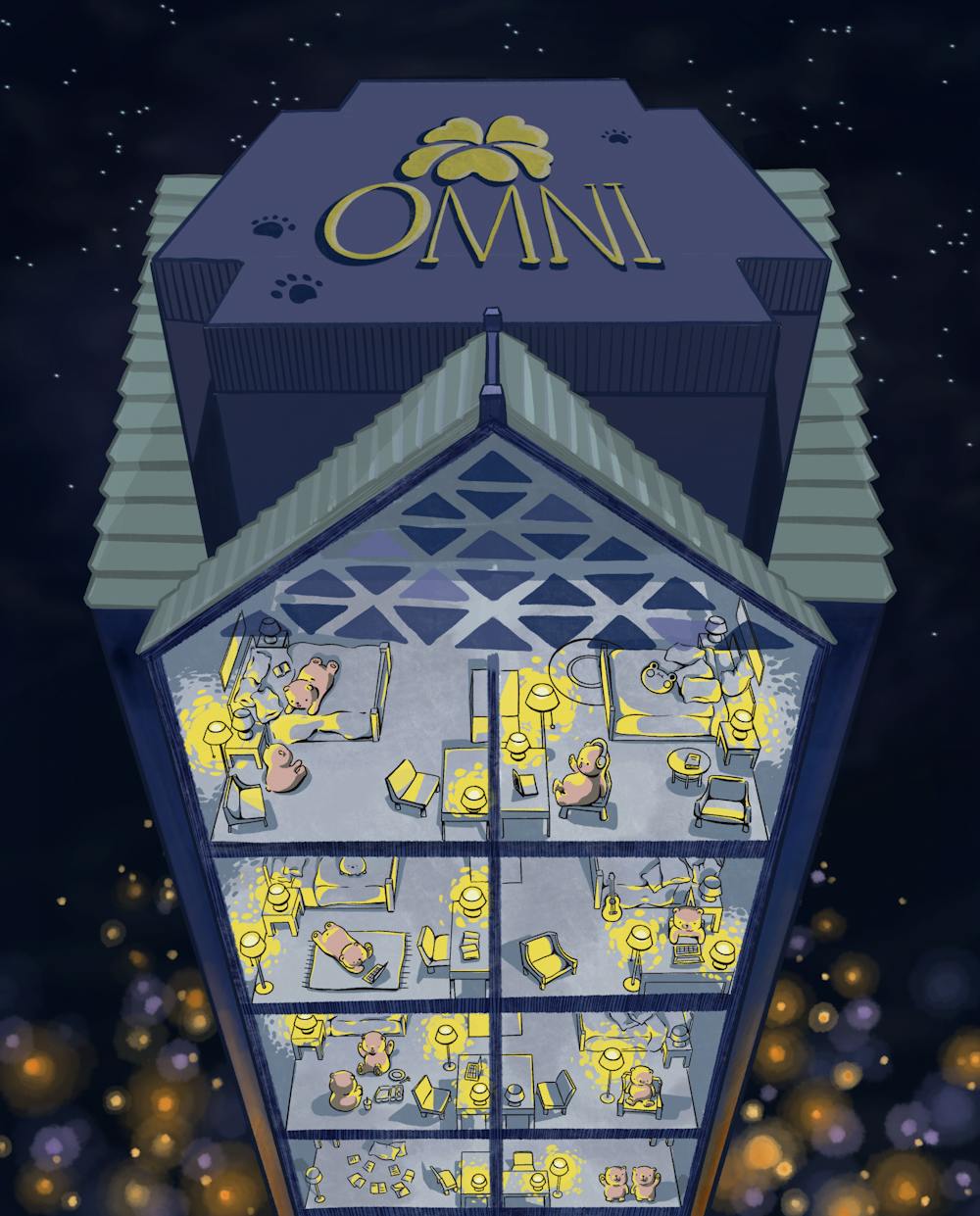Annie Cimack ’23 called her sophomore year living arrangements “a gilded cage.”
Yes, she had a view of the Rhode Island Capitol, a king-sized bed and a private bathroom. But, she noted, she was separated from most of her peers as a resident of the Omni Hotel.
“I remember sitting in the hotel room in the Omni and thinking … I'm back at college,” Cimack told The Herald.
Cimack was one of hundreds of Brown students who were thrust into unorthodox housing situations amid the COVID-19 pandemic. In order to accommodate more students returning to a “de-densified” campus in spring 2021, Brown leased multiple off-campus residences.
The spring 2021 housing lottery gave lower priority to sophomores, meaning many members of the class of 2023 could not live in dorms, instead being assigned to buildings including River House — an apartment complex in the Jewelry District that the University later acquired — and the Omni Hotel in downtown Providence.
But students who lived in hotel rooms and apartment buildings say they were able to form close friendships and lasting memories despite their isolation and detachment from College Hill.
Bringing back as many students as possible
The University started to consider leasing additional housing in the late summer and early fall of 2020, explained University Spokesperson Brian Clark in an email to The Herald.
Brown had committed to a “de-densified” campus, in which every student would have their own room to accommodate Zoom classes and limit the spread of COVID-19. Consistent with this goal, the University adopted a three-term academic calendar in academic year 2020-21, in which all students would be guaranteed two terms in Providence, The Herald previously reported.
In July 2020, the University announced it would lease four off-campus apartment buildings to house some juniors and seniors, The Herald previously reported. For the entire academic year, the University leased “around 220 beds” in various locations, according to Clark.
“The focus at all times was how we could best protect the health of our students, employees and Providence residents while delivering Brown’s world-class education,” Clark wrote.
After keeping COVID-19 cases relatively low in fall 2020, the University announced it would welcome all students back to Providence the following semester.
The goal was to bring “back as many students as we could safely accommodate from among those who wished to study in person in the spring 2021 while continuing the de-densified approach to housing that we'd employed in the fall 2020 term,” Clark wrote.
In spring 2021, out of the class of 2023, 4% lived in non-University leased off-campus housing or commuted, 23% joined remotely and 73% lived on campus or in University-leased housing, according to data provided by Clark. He noted that he could not provide specific data on how many students in the class of 2023 lived in leased housing.
Home sweet home
For Bryce Jones ’23.5, living in the Omni initially seemed to be a “pleasant” experience. He joked that the experience was like the “Suite Life of Brown University,” referencing the popular Disney channel show. But his initial impression soon soured.
The first couple of weeks, while students were supposed to be isolating in order to limit the spread of the virus, security guards were “patrolling the halls” and would knock on doors “if they could (hear) people talking,” Jones said.
“It was not going to be as fun as we had expected,” he added. “It was not going to be a social experience. It was very deliberately the opposite of that.”
Jones was not alone in feeling lonely. “We lost a bit of community,” said Peyton Newman ’23, who lived in River House. “We still had our pods, and they would come down and hang out sometimes. But the community at large felt very detached.”
Students were instructed by the University to only socialize in small groups, or pods.
For Cimack, staying in contact with friends on campus was difficult “because of the added restrictions of the pods.” She said that she was often unsure whether friends in other pods were comfortable socializing together.
“I felt … like life was going on without me on campus,” she said.
Detachment from campus and social isolation fostered mental health issues for those living in leased housing, multiple students said.
“Everyone's social skills were definitely damaged” during the pandemic, Jones said. He added that he spent most of his time “totally isolated” and his social skills were “decimated.”
He described one of his friend’s morning routine in which they would “wake up and just cry for a little bit.”
“The underclassmen years are such a great time to meet people … and gain a better understanding of yourself through the interactions you have with other people,” Jones explained. Due to the isolation during this formative period, he believes it made “people really cynical toward Brown.”
Students even found themselves missing Brown’s often-critiqued dining hall food. Residents of the Omni often only saw their peers while in line to pick up meals twice a day, according to Cimack.
“Getting meals was a big deal that was kind of at the core of my social life,” Jones said, adding that he would often coordinate with friends to get food at the same time.
While the Omni had dining services set up on their premises, those living in River House had to commute to campus to pick up food, Newman said — about a one-mile walk uphill.
Friendship in close quarters
Despite the challenges, leased housing helped foster close relationships with immediate pod members and neighbors, residents said.
Cimack was not initially close to her neighbor in the Omni, but over the course of the semester they became “a pod of 2,” she said. “I would go over to hers and watch a movie,” she added. “She'd come over to mine and eat dinner.”
Specifically, Cimack recalled watching “Stanley Tucci: Searching for Italy” — a popular television series centered on the actor Tucci eating various Italian foods — with her neighbor. “If I didn't have that connection within the Omni, it would have been such a different experience,” she said.
Newman recalled the strangeness of pivotal events during this time, particularly watching the results of the 2020 election, hosting her pod for Thanksgiving and celebrating her birthday in February.
Jones recalled how his pod would meet to watch movies and play chess during the spring 2021 semester. He had a room connected to one of his close friends, which was the site of many memories. “I remember listening to a whole lot of music … and forming a close friendship over a love of music with my pod-mates,” in addition to “watching people ice skate” from his window, he said. (The Omni overlooks the ice rink at Kennedy Plaza.)
Nevertheless, “the core of our social interactions was commenting on how strange … the whole situation was,” he said.
As restrictions were lifted, Newman remembered having “a bonfire on the rooftop of River House” with her friends and eating dinner.
“It's a good testament to the fact that we did figure … out how to keep these social relations and how to keep friendships alive even though it was tough,” she added.
A long-awaited return
For those who lived in University-leased housing, returning to College Hill came with additional challenges.
“I felt like a freshman coming onto Brown's campus as a junior,” Cimack said. “I felt like I missed a lot of my Brown experience. I felt like I was getting (a) late start.”
Newman described that — for her — the detachment of River House did not linger in the subsequent school year. Still, she noted that “there are some friends” who she was “not the most compatible (with) anymore” after a year apart.
The experience reminded some to make the most of their final two years before they walked out of Van Winkle Gates. “I definitely was very aware that I needed to soak it in while it was happening because … I was not gonna have as much time as people normally would,” Cimack said.
Despite the challenges that COVID presented, Cimack described feeling a sense of gratitude for her college experience. “'I’ve loved my time at Brown,” she said. “I've made incredible friends, and had great courses and teachers”
“I think they did everything to the best of their ability,” she added. “It was an unfortunate situation, and they just tried to figure it out.”
Even her time in the Omni did not overshadow her Brown experience: “I appreciate even the opportunity to come on to campus in some regard during that weird time.”

Ryan Doherty is the managing editor of digital content and vice president of The Herald's 135th editorial board. He is a junior from Carmel, NY who is concentrating in chemistry and economics. He previously served as a university news and science & research editor, covering faculty and higher education.





